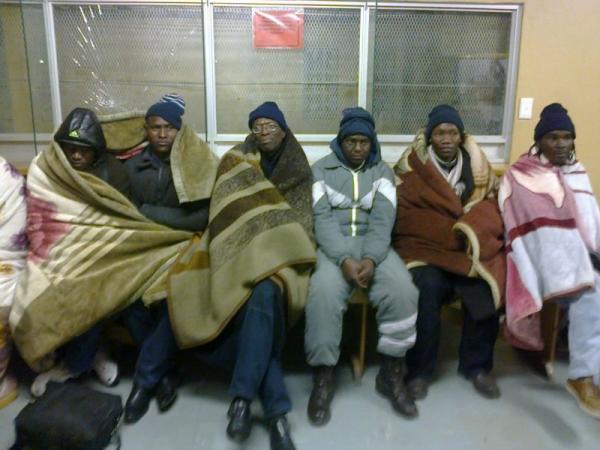The Week in Political Activism

This week we report arrests at a health demonstration in the Free State, the African Union’s recent move to immunise leaders from war crime prosecution, and an upcoming school infrastructure reform conference.
Health demonstrators arrested after peaceful vigil in Free State
This morning police arrested over 100 community health workers and Treatment Action Campaign (TAC) demonstrators in Bloemfontein. The demonstrators were staging a night vigil sit-in at Bophelo House, the head office of the Free State Department of Health.
The group of community health workers, largely composed of elderly women, had been trying for months to engage with Free State MEC of Health Benny Malakoane about the shortcomings of the Free State health system. Some workers had recently been fired without notice.
TAC joined the workers in demonstrations scheduled to continue through today. According to TAC, “This latest sit-in signalled the start of a campaign of civil disobedience in the Free State to demand that Malakoane be removed from his position given the desperate state of the health system in the province.” TAC is considering litigation against Malakoane and the health department.
Workers had staged an earlier sit-in on 26 June.
TAC condemns the police for excessive use of force in breaking up the protest this morning. The organisation claims one of its leaders was assaulted by police and suffered bruises to the face.
TAC has requested a meeting with ANC Secretary General Gwede Mantashe.
SALC condemns African Union’s decision to grant selves immunity from war crimes
The Southern Africa Litigation Centre (SALC) and International Bar Association (IBA) released a statement yesterday criticising the African Union’s decision to grant themselves immunity from war crimes.
At the African Union summit in Equatorial Guinea in June, leaders approved a “Protocol on Amendments to the Protocol on the Statute of the African Court of Justice and Human Rights.” This motion entrusts the African Court for Justice and Human Rights with prosecuting for war crimes, crimes against humanity, genocide, and other crimes. However, it bars the court from prosecuting sitting African heads of state and senior officials for such crimes.
Forty-two African and international civil society and rights groups objected to the amendment in an open letter before the summit. Amnesty International called the decision “a backward step in the fight against impunity and a betrayal of victims of serious violations of human rights.”
The IBA and SALC say the Protocol conflicts with both the Rome Statute of the International Criminal Court and the African Union’s founding charter. In yesterday’s statement, “The IBA and SALC call upon individual African states not to sign or ratify the Protocol as currently drafted.”
Conference to tackle school infrastructure reform
On 14 and 15 July Equal Education, SECTION27, the Equal Education Law Centre and Legal Resources Centre will host a conference in Johannesburg to discuss implementation of the Norms and Standards for School Infrastructure policy, released in November 2013.
The policy sets infrastructure targets for all public schools. It targets investment in education as a government responsibility.
“This conference is vital to ensuring that this important new law translates into real schools with classrooms, water, electricity, sanitation, libraries, computer centres, and all the facilities they need,” SECTION27 said in a press statement.
The conference will honour Michael Komape, a young student who died this year when he fell into a pit latrine at school. “Michael’s death is a reminder that many township and rural schools have inadequate and unsafe school infrastructure that place young children in danger every day,” Equal Education said in a press release. “The campaign for proper school infrastructure is one that wishes to ensure that such tragedies do not occur.”
Effective implementation of norms and standards will require collective action from government and civil society to ensure an equal and quality education for all, according to Equal Education.
The conference will host various stakeholders and high school students from across the country. There is no registration fee but a R150 donation is suggested. The event will be held at the Wits Education Campus in Parktown. Attendance is capped at 200.
For more information please contact Kimber van Valkenburg: vanvalkenburg [at] section27.org.za
Next: Community health workers detained
Previous: Langa protest in photos

This article is licensed under a Creative Commons Attribution-NoDerivatives 4.0 International License.


